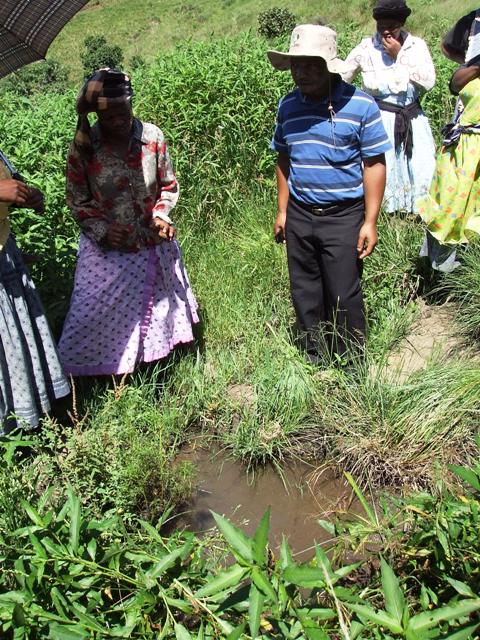March 2009. J. Rosenfeld & J. Waterkeyn
The base line survey has been completed for Umzimkhulu and provides some guidelines as to the most pressing gaps in health knowledge that can be filled and hygiene behavior that can be changed by the Community Health Clubs. Based upon the results of this report, and given that the three selected villages are representatives of the whole of Umzimkhulu, it would appear that the CHC Approach can make significant differences in the lives of the participating communities. The three selected villages represent a high, medium and lower living standard and it is reasonable to assume that the rest of the district will fall somewhere in between. It would also appear that the topics to be done in health promotion sessions are indeed appropriate for the target communities, and that the training can proceed without alteration to the training materials. If the 24 health sessions are completed as planned we can expect that there will be significant improvement in health knowledge and behavior, and would predict an average of between 20-30% change in most hygiene behaviours.

The training intends to focus on water usage and storage, safe disposal of human faeces and solid waste, as well as diseases that can be prevented by poor hygiene such as diarrhoea, scabies, ringworm, and intestinal worms. This report highlights that there is indeed room for improvement in all these areas. 80% of the households that were surveyed in the three villages still use unprotected water, and 51% have dirty latrines, 60% had a fly problem in kitchens of with only 43% of those with left over food making any to protect food from flies. 55% ofhouseholds reported rats were a problem and with 74% reporting a rubbish problem and with 54% of households having solid waste within close proximity, these are areas that can be improved significantly. Handwashing probably provides the best opportunity to impact on the prevalence of diarrhea as only 8% households use soap regularly. As regards levels of health knowledge there is little doubt that the programme will register a significant rise in good health knowledge from the average of 18.6%for the six topics which were asked.
It is also clear that the district of Umzimkhulu is an ideal area for a pilot project as the level of safe water supply, sanitation and general hygiene is decidedly low as compared to more developed areas in Kwa Zulu Natal. This low base line will enable a clear measurement of impact using the proxy indicators that have been carefully linked to the training and the recommended practices which are expected to be put into place within the next six months. Given the current low provision of safe water supply and adequate sanitation, this base line report should to circulated to service providers of water and sanitation to alert the relevant authorities that within a few months there will be a sudden demand as a result of this training programme, and that planning to deal with this demand should be already in place to ensure a seamless transition from demand creation to improved living conditions in Umzimkhulu.
Now that the base line survey is complete, the Community Health club training will start in 10 wards. the facilitators have been selected from the community and are being trained in bi-weekly sessions. They have already mobilised their communities and initial response is very encouraging. There are estimated to be an average of 75 members per club and one club has even exceeded 150 people all looking forward to the future training. Most facilitators have already done five sessions and will be finished within another five months.
Start up has been delayed by two months due to slow uptake by some councillors but reports are now coming in that the councillors are excited about the initial activities and those that were slow to apply for the project are now regretting the fact that they missed the deadline. At present this project is supported by Danida and IWRM until June 2009 through the Department for Water Affairs and Forrestry but given the demand there is likely to be a viable programme in Umzimkhulu for many years to come and support is being sought for the scaling up of this novel approach that holds such promise for the poorer areas of KwaZulu-Natal.
